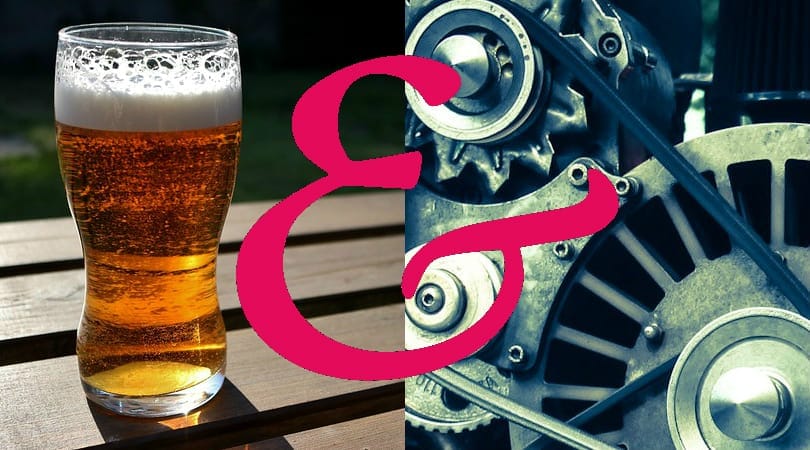
This website uses cookies to improve your experience. We'll assume you're ok with this, but you can opt-out if you wish. Read More
The Next Round: What happens after you change your drinking?

The human body is extraordinary. As opportunistic omnivores, humans are able to consume a wide range of foods and drinks, and our genetics give us an enviable ability to use these as sources of energy. Key to this is our metabolism. But what is does metabolism mean, and how does alcohol affect it?
First, some basic biology. Like an engine in a vehicle, metabolism is the name given to the mechanisms in our bodies that keep us moving. It’s a catch-all term describing the role that enzymes play in helping us grow, maintain ourselves, reproduce and respond to our environments. Focusing on digestion, our metabolism turns the things we eat and drink into substances our bodies can use. The precise working of our individual metabolism is determined by our specific genetic makeup. Although all humans share the same basic metabolism, variations in specific enzymes affect how we respond to different substances.
This is particularly true of alcohol. Alcohol is primarily broken down by two specific enzymes, alcohol hydrogenase (ADH) and aldehyde hydrogenase (ALDH). Although our livers play a vital role in helping us deal with alcohol, our stomachs, pancreases and even our brains are involved. The first stage involves ADH turning alcohol into acetaldehyde, a highly toxic substance which is a known carcinogen (a substance that can cause cancer). Fortunately, this is where ALDH comes into play, quickly turning acetaldehyde into acetate. This can be broken down into carbon dioxide and water, which can easily be eliminated by our bodies.
Regardless of how much alcohol we drink, our bodies can only process a certain amount each hour. People talk about “one unit per hour” – the idea that our livers can process 10ml of pure alcohol each hour after it’s been consumed – but that is just a rule of thumb. The way that ADH and ALDH work can vary from person to person and our genetics determine how fast or slow these enzymes work. People with fast working ADH and slow working ALDH are particularly prone to feel the negative effects of drinking alcohol, such as facial flushes, nausea and a rapid heart rate, as acetaldehyde quickly builds and can’t be easily eliminated. But if ALDH works quickly too, the toxic effects of alcohol consumption might not be felt at all, leading us to drink more. Some research has suggested that those of us with the fast working variant of ALDH can be particularly prone to becoming dependent on alcohol, simply because we find it easier to drink.
At a biological level, there is nothing we can do about how these particular enzymes work. That is determined by the genes we were born with. But learning how our bodies work can help us make better choices, including understanding what alcohol does to other aspects of our metabolism.
Our bodies cannot store alcohol. When we drink it, it is quickly absorbed through our small intestines and ends up in our bloodstream. Because it cannot be stored for later use, unlike fats and sugars, it goes to the front of the queue to be dealt with by our livers. Effectively, drinking alcohol puts every other digestive process on hold, which can lead to the build-up of fat in the liver, one of the first steps towards liver disease.
However, the effects of alcohol on our metabolism are complex, and not entirely understood. While alcohol is, after fat, the most energy dense substance we can consume, studies have not shown a clear relationship between alcohol consumption and weight, at least when looking at whole populations. In fact, because our bodies prioritise dealing with alcohol, and our intestines can be damaged by heavy drinking, very heavy or dependent drinking can actually be associated with having a lower body weight, with a real risk of malnutrition.
Every human has a basal metabolic rate, which is a calculation of the energy our resting bodies need to use each day just to keep us alive. It is true that it can vary widely. But the relationship between our metabolic rate and our weight isn’t entirely straightforward. Different people with different basal metabolic rates can weigh the same, and having a particularly high or low basal metabolic rate doesn’t necessarily predispose any of us to gain or lose weight. In fact, some studies have shown that those of us who are overweight have higher basal metabolic rates since big bodies need more energy just to keep going.
For those of us who have gained weight from drinking alcohol, we have to be honest that the likely cause is not our metabolism, but our levels of activity. Yes, we can increase our basal metabolic rate through exercise, building muscle, and eating protein, but in the end, an evening on the sofa with a bottle of wine is not an evening in the gym.
Our metabolism is a genetic lottery, but that does not mean that any of us have to be trapped by it. That includes how we deal with alcohol. Some of us find drinking easy, perhaps too easy. Some of us find it difficult but have struggled on despite the feelings of flushing and nausea. The variations in our ADH and ALDH enzymes have played a part it that, but as with any aspect of our biology, that’s not the end of the story.
Ultimately, when it comes to our drinking, our weight, and any other aspect of our lives, we can choose how we live in the bodies that nature has given us. And we can choose to live well.
If you’re worried about your drinking, wondering how to change and want to live well, why not start with Club Soda’s free short course, How to Change Your Drinking. You’ll get a personalised assessment of your drinking habits, money off alcohol-free drinks and our essential tips for changing your drinking. Sign up today.
This website uses cookies to improve your experience. We'll assume you're ok with this, but you can opt-out if you wish. Read More
| Name | Domain | Purpose | Expiry | Type |
|---|---|---|---|---|
| wpl_user_preference | joinclubsoda.com | WP GDPR Cookie Consent Preferences. | 1 year | HTTP |
| PHPSESSID | www.tickettailor.com | PHP generic session cookie. | 55 years | HTTP |
| AWSALB | www.tickettailor.com | Amazon Web Services Load Balancer cookie. | 7 days | HTTP |
| YSC | youtube.com | YouTube session cookie. | 55 years | HTTP |
| Name | Domain | Purpose | Expiry | Type |
|---|---|---|---|---|
| VISITOR_INFO1_LIVE | youtube.com | YouTube cookie. | 6 months | HTTP |
| Name | Domain | Purpose | Expiry | Type |
|---|---|---|---|---|
| _ga | joinclubsoda.com | Google Universal Analytics long-time unique user tracking identifier. | 2 years | HTTP |
| sbjs_migrations | joinclubsoda.com | Sourcebuster tracking cookie | 55 years | HTTP |
| sbjs_current_add | joinclubsoda.com | Sourcebuster tracking cookie | 55 years | HTTP |
| sbjs_first_add | joinclubsoda.com | Sourcebuster tracking cookie | 55 years | HTTP |
| sbjs_current | joinclubsoda.com | Sourcebuster tracking cookie | 55 years | HTTP |
| sbjs_first | joinclubsoda.com | Sourcebuster tracking cookie | 55 years | HTTP |
| sbjs_udata | joinclubsoda.com | Sourcebuster tracking cookie | 55 years | HTTP |
| sbjs_session | joinclubsoda.com | SourceBuster Tracking session | Session | HTTP |
| Name | Domain | Purpose | Expiry | Type |
|---|---|---|---|---|
| mailchimp_landing_site | joinclubsoda.com | Mailchimp functional cookie | 28 days | HTTP |
| __cf_bm | tickettailor.com | Generic CloudFlare functional cookie. | Session | HTTP |
| NID | google.com | Google unique id for preferences. | 6 months | HTTP |
| Name | Domain | Purpose | Expiry | Type |
|---|---|---|---|---|
| _ga_10XZMT03ZM | joinclubsoda.com | --- | 2 years | --- |
| AWSALBCORS | www.tickettailor.com | --- | 7 days | --- |
| cf_clearance | tickettailor.com | --- | 1 year | --- |
| VISITOR_PRIVACY_METADATA | youtube.com | --- | 6 months | --- |
Join Club Soda for 10% off your first order of drinks for UK delivery. Plus get our latest news and special offers for members to choose better drinks, change your drinking and connect with others.
If you get an error message with this form, you can also sign up at eepurl.com/dl5hPn